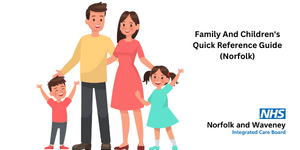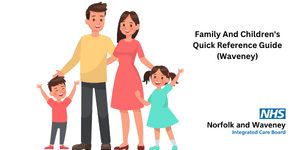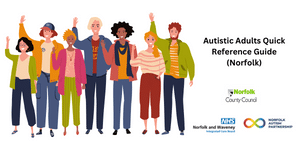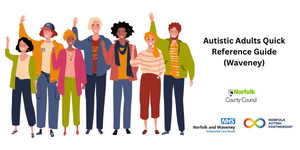This page will provide you with a range of Resources, Information and Signposting opportunities to services within Norfolk who support those with and those caring for on The Autism Spectrum.
There are also some quick reference guides that have been co-produced for Children, Families
and Adults in Norfolk and Waveney. To go directly to those please click here.
Autism Central Hubs offer guidance to families, carers and personal assistants of autistic people. All of our sessions are run by Peer Educators. These are parents or carers of autistic people, who are happy to share their knowledge and experience with you. They offer group and one-to-one sessions to help you and other parents and carers find the information and services available in your area. Hubs may also run events such as workshops, drop-in sessions, coffee mornings or virtual meet-ups.
East Of England Autism Central Hub Website
The main Autism Central website offers a range of resources and information for autistic people and their parents and carers on a range of topics
These documents have been co-produced by a group of autistic people, to help autistic adults to prepare for a conversation with a worker from Adult Social Services.
There is both a short introduction, and a longer guide.
Thank you to members of the Autism Social Care Reference Group who worked with Adult Social Services to create these two guides.
For a full range of cost of living support avaible please click here
Adult Autism Diagnosis
The Adult Diagnosis Service is available to people aged 18 and over without a learning disability. To find out more about the service and how to get referred, visit the Autism Service Norfolk page.
Children’s Autism Diagnosis
The children’s pathways to getting an assessment for autism vary greatly between areas. For further information, see the Autism Spectrum Disorder (ASD) page.
Patients Choice/Right to Choose (Children and Young People)
In many cases you have the legal right to choose where you have your NHS treatment. The NHS is offering more and more options to enable you to make choices that best suit your circumstances, giving you greater control of your care, and hopefully better results.
If a GP needs to refer you for a physical or mental health condition, in most cases you have the legal right to choose the hospital or service you’d like to go to.
This will include many private hospitals if they provide services to the NHS, and it does not cost the NHS any more than a referral to a standard NHS hospital.
Working Well Norfolk
Working Well Norfolk is provided by Seetec. Their support can include
Identify your skills – Uncover your strengths to find the right job
Create a winning CV and prepare for interview – Help to make a great first impression
Connect with local employers – Meet with businesses who are looking to recruit
Rebuild your confidence: Boost your self-belief, resilience and wellbeing
Overcome challenges: Practical assistance to navigate any obstacles in your way
Once you start in work, they willl help you settle and progress in your new role.
Already in work?
Working Well Norfolk can also help if you’re already in work and are struggling due to your disability or health condition.
They will provide in-work support for you and your employer to help you keep your job. For example, through arranging reasonable adjustments, flexible working or training.
Voluntary Norfolk
We deliver employment support across Norfolk to people who are out of work, whatever their age, location and however long they have been unemployed. We help clients develop their skills, search for jobs and overcome the barriers that are preventing them finding employment.
Learn more about our employment and skills projects
The Feed
We provide supported work experience placements for adults who face barriers to employment.
The work experience is within our cafés and catering business and there are various roles that you can try. You do not have to be interested in working in catering and hospitality as you will learn many different practical skills that you can use in other job roles.
We aim to help you build your confidence, motivation and self esteem in our positive learning environment.
The programme takes place for 40 hours typically spread over a 10 week period.
Norfolk Industries for Disabled People
Our long experience of employing people with disabilities makes us well-placed to understand the barriers they can face when trying to get a foot on the employment ladder.
We also get to see, first-hand, the benefits employment can bring – from enhanced well-being, confidence, and work skills to greater independence.
Our work placement schemes are designed to support people who are struggling in their quest for work, whether through disability or other life problems.
We provide tailored packages of support that include training, qualifications, and work experience in a real production environment. Our aim is to get the best out of everyone, whatever their disability or background, and take them that step closer to finding employment.
Visit the Norfolk industries for Disabled people websit
Local Supported Employment
The Norfolk County Council Local Supported Employment programme is to help adults with learning disabilities and/or autism to
move into and stay in work.
If you live in Norfolk.
• Are 18 years old or over.
• Not in paid work or full-time education.
• Not on another employment support programme
Find out more at:
www.norfolk.gov.uk/LSE or contact our team on 01603 223910 or by emailing us at: LSE@norfolk.gov.uk
Health Passport
‘My Health Passport’ is a resource for autistic people who might need hospital treatment.
The passport is designed to help autistic people to communicate their needs to doctors, nurses and other healthcare professionals. It was developed by Baroness Angela Browning – an National Autistic Society Vice President – in collaboration with The National Autistic Society.
It was independently reviewed in 2017 and updated following comments by autistic people and professionals about how they were using it or wanted to use it.
Download the autism health passport (PDF)
More information on the Health Passport can be found at the National Autism Society Website
National Autistic Society:
- Seeking Help with Mental Health – Reasonable Adjustments
- Accessible Environments
- Too Much Information – Too Much Information (TMI) was our campaign to increase public understanding of the five core features of autism and to give people an understanding of what actions they can take to help autistic people.
- Autism-friendly Check List – Use these lists to see how autism-friendly your organisation or company is and which areas you need to work on.
Norfolk and Suffolk NHS Foundation Trust:
This manual is a practical guide and reference document. It is designed to help health
services make the reasonable adjustments for people with learning disabilities and autistic
people that they need to. The various sections will be of interest and use to different people
and it is not intended that the whole document is read, absorbed and completed by all
health professionals.
Norfolk County Council Adult Social Care:
Norfolk County Council Adult Social Care worked with autistic adults to put in place an adult autism-friendly communication guide. We used this guide to help us communicate effectively with autistic
people in working together to plan a new autism social care early help service. We hope to share this co-produced tool to support adult social care and wider services, to work more effectively with autistic people to meet their needs.
Self Advocacy Booklet:
This booklet has been designed by members of the Hear Me, See Me Voice Groups across the East of England. .
Recovery Colleges provide free educational workshops and courses. They open to everyone and they are designed to support people on their mental health recovery journey. They are aimed to help others invest in their own wellbeing.
All the courses cover a variety of topics and follow a personal recovery approach which encourages:
- Self-knowledge and acceptance
- An understanding of the principles of recovery
- Learning and applying new skills and strategies
- Leading a meaningful life with or without symptoms
The aim is to empower people to take control of their own lives and become experts in their own recovery – people choose their own courses to attend.
It is a safe space to learn among other people who have experienced mental health challenges.
The Recovery College is not a replacement for clinical support, it works alongside it.
The courses have been categorised to help guide students:
• Begin – to understand yourself
• Build – a toolkit of self-help skills
• Understand – aspects of the challenges you may be facing
• Grow – a plan for your future
All the courses are centred on the principles of CHIME – Connection, Hope, Identity, Meaning and Empowerment.
Highlighted course : Living Well With Autism

The course is suitable for people who have a diagnosis of autism, people who suspect they may have autism, supporters and professionals looking to enhance their knowledge further around autism.
The course covers:
- That there are challenges that go alongside a diagnosis of autism
- Positive ways to enable people to live well with autism
- An understanding into some of the features of autism and how it impacts individuals
- A personalised coping strategy toolkit
Course duration: Five sessions of 2 hours 30 minutes
Autistic Adult Quick Reference Guide
(Norfolk)
Autistic Adult Quick Reference Guide
(Waveney)




